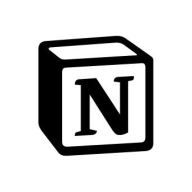

Basecamp and Notion are project management tools with distinct strengths. Notion offers superior value with its extensive features and integration capabilities.
Features: Basecamp provides essential tools like to-do lists, message boards, and automatic check-ins, focusing on simplicity and efficiency. Notion enables users to create custom dashboards and databases, with detailed note-taking options and a versatile workspace that integrates various functions. Notion's feature set allows for advanced customization, catering to complex project needs.
Ease of Deployment and Customer Service: Basecamp offers a straightforward deployment process with effective support, facilitating quick setup and onboarding. Notion provides flexible deployment options supported by extensive documentation and community resources, though it may have a steeper learning curve due to its dynamic and customizable platform.
Pricing and ROI: Basecamp features a flat-rate pricing model, appealing for predictable budgeting and offering tangible ROI. Notion's scalable pricing structure can be cost-effective for organizations making full use of its capabilities, with its value proposition justifying the cost especially for advanced customization and integrations. Basecamp charges a $99 monthly fee while Notion offers plans starting at $10 per user per month, highlighting Notion's adaptability to different team sizes and needs.


Basecamp is a web-based project-management tool developed by Basecamp and launched in 2004, with a new version being launched in 2012. Basecamp offers to-do lists, wiki-style web-based text documents, milestone management, file sharing, time tracking, and a messaging system. Basecamp Classic also offers integration with Basecamp's own Campfire product, and features APIs that are used by a host of web and mobile apps. Basecamp Classic's interface is available in different languages (e.g. Spanish, French, Italian, German, Finnish and Japanese). The newer version of Basecamp currently only supports English as the interface language.
Notion is an all-in-one workspace that enables teams to collaborate, organize, and manage their work effectively. Its primary use case is to streamline project management, knowledge sharing, and task tracking. With its versatile functionality, Notion allows users to create and customize databases, wikis, and documents, making it a powerful tool for organizing information.
The most valuable functionality of Notion lies in its flexibility and ease of use. Users can create and link various types of content, such as text, images, files, and even embed external resources. This enables teams to centralize their work and collaborate seamlessly, eliminating the need for multiple tools. Notion's drag-and-drop interface and intuitive editing features make it accessible to users of all technical backgrounds.
Notion helps organizations by fostering transparency, improving productivity, and enhancing knowledge management. By providing a centralized platform for collaboration, teams can easily access and contribute to shared projects, reducing communication gaps and ensuring everyone is on the same page.We monitor all Project Management Software reviews to prevent fraudulent reviews and keep review quality high. We do not post reviews by company employees or direct competitors. We validate each review for authenticity via cross-reference with LinkedIn, and personal follow-up with the reviewer when necessary.